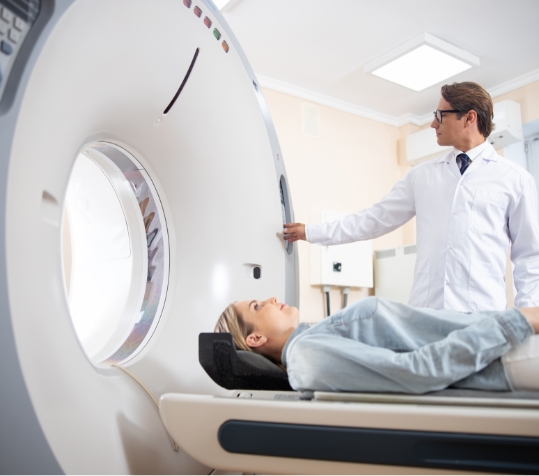This website contains information intended only for persons professionally dealing with medical devices (e.g. for persons performing medical professions, for persons dealing with the distribution of medical devices). Please confirm that you are a medical device professional to proceed.

 Cardiolens FFR-CT Pro® Diagnostic Test
Cardiolens FFR-CT Pro® Diagnostic TestAt Hemolens Diagnostics, we have developed a non-invasive method of diagnosing coronary artery disease with the help of FFR-CT. Cardiolens FFR-CT Pro® combines two non-invasive diagnostic tools: Coronary Computed Tomography Angiography (CCTA) and Continuous Non-invasive Blood Pressure (CNBP). In combination with computational fluid dynamic principles, these data are used to generate a 3D model of the blood vessels, allowing for a detailed anatomical and functional evaluation of coronary arteries. This information allows the overseeing physician to better evaluate stenosis severity and thereby plan appropriate treatment or follow-up.
Hemolens Diagnostics follows the unstoppable trend of the digitalization of medicine. Drawing from computational fluid dynamics algorithms, this technology can be applied in the future to numerous other disciplines including oncology, pulmonology, angiology or neurology. It could soon become the gold standard around the globe.
The FFR-CT measurement and 3D coronary models are obtained using computational fluid dynamics algorithms. Coronary CT angiography (CCTA) and continuous non-invasive blood pressure (CNBP) measurements from each patient are used as the basis input for these algorithms to generate accurate patient specific simulations of their coronary artery network.
The physician receives the test results in the form of a 3D image of the coronary vasculature, with anatomically significant stenoses flagged. Pointing to a given stenosis displays the relevant calculated FFR-CT parameter.
Intended Use:
Cardiolens FFR-CT Pro is a coronary physiologic simulation software for the clinical quantitative and qualitative analysis of previously acquired Coronary Computed Tomography Angiography (CCTA) and optionally with Continuous Non-invasive Blood Pressure (CNBP) data for assessment of patients with suspected Chronic Coronary Syndromes (CCS). It provides hemodynamic diagnostic factor FFR-CT (Fractional Flow Reserve with Computed Tomography), a mathematically derived quantity, computed from simulated pressure, velocity and blood flow information obtained from a 3D computer model generated from static coronary CT images and optionally from CNBP measurement. The factor FFR-CT at the output of Cardiolens FFR-CT Pro device is intended to support the functional evaluation of coronary artery disease. The Cardiolens FFR-CT Pro outputs are provided to support qualified clinicians to aid in the evaluation and assessment of coronary arteries. The results of Cardiolens FFR-CT Pro are intended to be used by qualified clinicians in conjunction with the patient’s clinical history, symptoms, and other diagnostic tests, as well as the clinician’s professional judgment.


